Table of Contents
Have you ever read about the harmfulness of your favourite food and but a week later you learned the exact opposite from another source? Eating is a theme full of half-truths that contradict each other. However, our article is based on scientific studies and you will find 15 proven nutritional myths that are refuted by credible research.
15 most famous nutritional myths
1. Salt causes high blood pressure
Salt grains are associated with high blood pressure, kidney damage and the risk of cognitive impairment. Kitchen salt contains 40% of the mineral sodium that is required for functioning of our body. However, some foods show salt content on the label, others only sodium content, and therefore there are frequent discrepancies. So, if you want to get a picture of the salt content in your food, multiply the amount of sodium by 2.5 to find out the real proportion of salt in the product.
Too small but also large amounts of sodium cause problems in the human body. Low sodium affects brain activity and therefore one feels slow and lethargic. Conversely, high sodium intake is associated with osteoporosis, kidney disease, hypertension, or heart disease. According to the World Health Organization, the daily intake of sodium should not exceed 1500 mg, which is half a teaspoon of table salt. If you stick to this recommended amount, you don’t have to worry about the negative effects of sodium. [1] [2] [18]
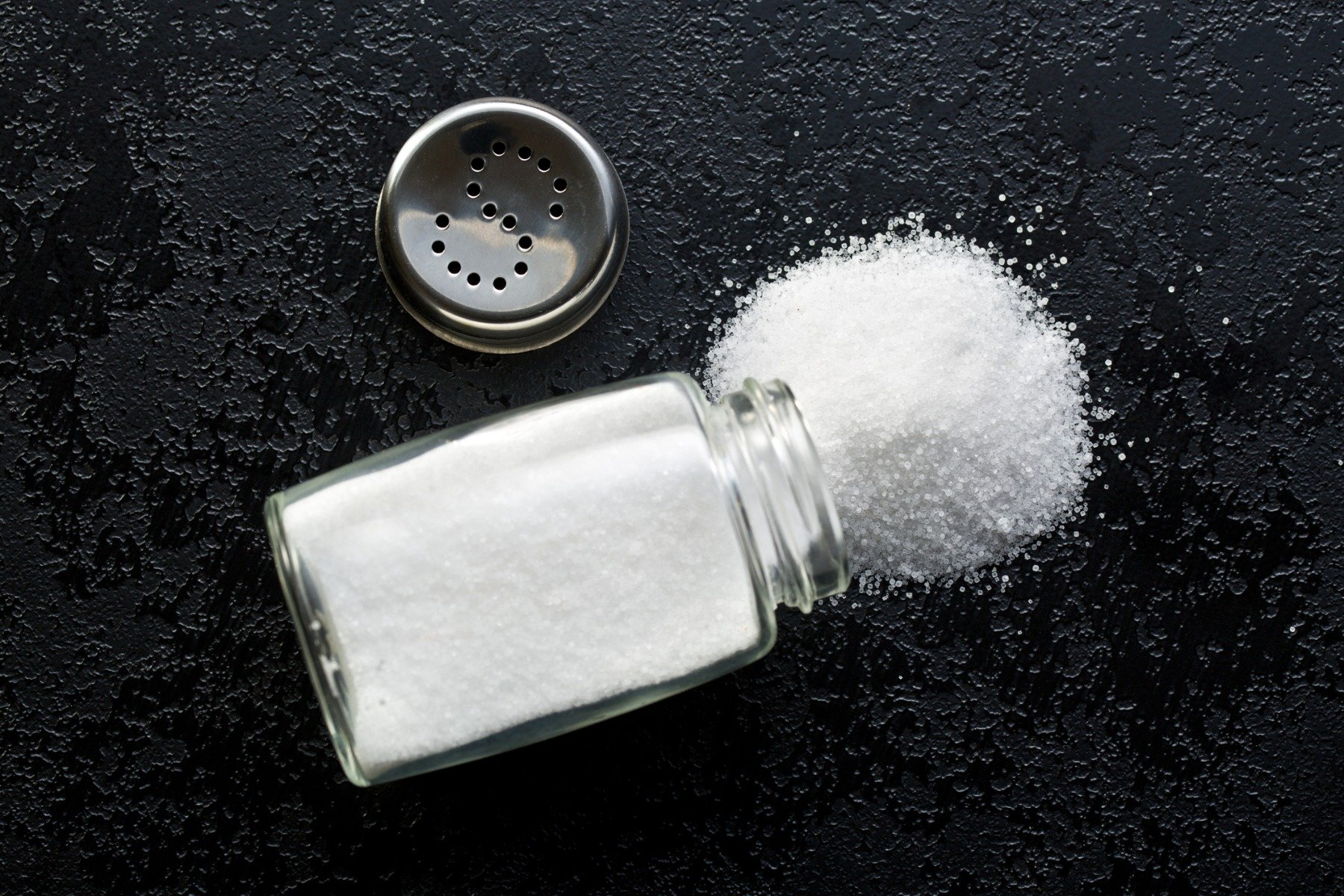
Why is table salt iodized?
Iodine naturally occurs only in the vegetables that absorb it through the soil. However, the consumption of vegetables from iodine-free soil led to its deficit in the body, so in 1920 salt began to be iodized worldwide. As everyone uses the salt, it has become a convenient means of providing iodine intake for the entire population.
After all, iodine is very important for the functioning of the thyroid gland and its hormones – thyroxine and triiodothyronine. The absence of iodine causes a disease called goiter, which is associated with thyroid swelling. Its deficiency is particularly dangerous in pregnancy because iodine is responsible for the full development of the fetal brain. [3] [19] [20]
2. Saturated fats and trans fats are one and the same
Saturated and trans fats are referred to as “bad fats” in the media and are considered by the public to be the same. But this myth is not true either. Trans fats are really harmful to our body, they cause a risk of heart disease, metabolic problems or insulin resistance. Saturated fats are significantly less harmful compared to trans fats. [13]
Saturated fats are found in meat, dairy products, baked goods, palm or coconut oil. At room temperature, they are in a solid state and are therefore referred to as “solid fats”. In appropriate quantities are harmless to the organism. If saturated fats make up less than 10% of your daily calorie intake, you don’t have to worry about them at all. Only too high a saturated fat intake can be harmful, which can increase cholesterol levels and the risk of cardiovascular disease. [15]
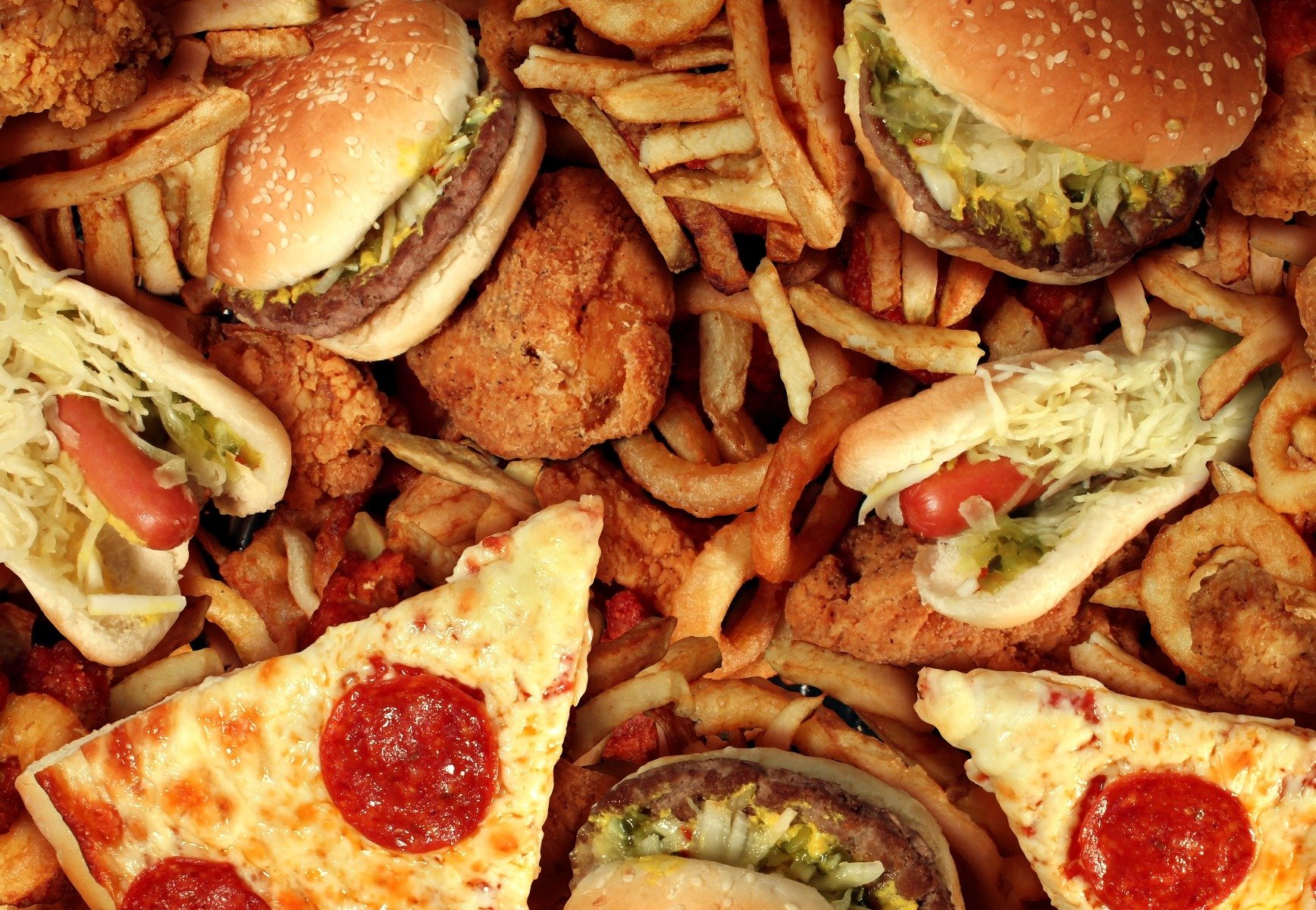
Trans fats do not occur in nature, because they are artificially created by adding hydrogen to vegetable oils to make them stiffer. They increase the level of “bad” LDL cholesterol while decreasing the content of “good” HDL cholesterol, which causes the risk of heart disease. The risk of cardiovascular disease is 3 times higher when consuming trans fats than other types of fats. They are found in fries, cakes or fast food. [15]
The human body needs a certain fat intake for the proper functioning of the body, but trans fats are of no importance to us. They are definitely more harmful than saturated fats.
You might be interested in these products:
3. You have to drink 2 litres of water a day
Have you been convinced that drinking 2 litres of water a day is enough? We may disappoint you, but this myth has been refuted years ago. Water intake is crucial for the body, but 2 litres of fluid is not enough. According to the 2004 report, women should receive 2.7 litres and men 3.7 litres of water per day. We must also remember that one also receives water from food, which should account for 20% of total daily fluid intake.
The well-known rule of 2 litres of water is not true just because by urinating, sweating and breathing the human body expels roughly the same amount of fluids a day. You do not even need to work intensively or stay at the equator to eliminate 500-1000 ml of water every day. If you exercise regularly, you should increase your daily water intake even more and supplement it with the necessary minerals. To learn about the effects of hydration on your body, read our article – Hydration before, during, after training and how to avoid dehydration. [4] [25]

4. Proteins damage bones and kidneys
The reason for the fear of kidney disease due to higher protein intake is a study that considered more protein in the diet to be an increased burden on the kidneys. Later research, however, refuted the results of the study and confirmed that kidney problems are not the result of higher protein content in the diet. [1]
Another claim links protein consumption to bone diseases. Protein consumption also leads to the formation of acid, which is neutralized by calcium from stores in the bones. This has led to the belief that more protein causes loss of bone tissue. However, studies have shown that more calcium in urine is not affected by protein but by calcium alone. The more calcium enters into our body, the more we eliminate it. [1]
Other studies have confirmed that proteins improve calcium absorption and bone growth. It means exactly the opposite, the protein is not harmful to the bones, but can protect them. You do not have to worry about protein consumption, as several studies confirm the safety of higher protein intake and its importance in weight reduction. [1] [2]
5. You shouldn’t eat carbohydrates in the evening
Any carbohydrates you take after 6 p.m. will automatically turn into fat. This belief refers to slower metabolism at night and lower insulin levels. However, the 2011 study refuted this myth. A group of participants consumed 80% of carbohydrates at night and their weight dropped more significantly than the test subjects receiving carbohydrates throughout the day. Evening group participants also reported less hunger. By providing these results, we certainly do not want to convince you to increase carbohydrate consumption in the evening. However, if you have eaten sensibly during the day but feel hungry in the evening, the fear of carbohydrates is unnecessary. You can easily eat something small with carbohydrates and ideally protein. This will promote growth and regeneration of muscles and, in addition, you will soothe the hungry stomach. [14]

6. Red meat causes cancer
Another myth that spreads unnecessary fear is that eating red meat causes cancer. A 2014 research suggests that processed red meat, especially charred meat, may increase the risk of cancer for people with bad lifestyle. Adequate red meat intake in combination with fruits, vegetables and dietary fibre does not pose a serious disease risk. [1]
However, studies have shown a possible risk of polyaromatic hydrocarbons containing smoked meat. According to scientists, it can potentially damage the genome and thus pose a threat. Smoked meat is therefore not one of the healthiest ingredients in the diet, and excessive consumption of meat may pose a risk in the case of unbalanced diet. [1]
7. Coffee is unhealthy
This myth is most often associated with caffeine content in coffee. According to many people, coffee drinkers are damaging their health because of their love to caffeine, which is not true. It is scientifically proven that caffeine is absorbed into the bloodstream and subsequently reaches the brain where it blocks adenosine. This process causes increased levels of norepinephrine and dopamine, and this causes an increase in neuronal activity. Studies, therefore, declare a positive effect of caffeine on brain functions. According to them, caffeine can improve memory, mood, reaction time, but also general mental functions. Caffeine increases blood pressure, but coffee also contains ingredients with exactly the opposite effect. They are called polyphenols and are an important part of coffee because they lower blood pressure, reduce the risk of heart disease, and improve blood flow to the brain. [5] [6]
Caffeine has also several other benefits for the body [7]:
- improves physical performance
- breaks down fat
- contains vitamins B2, B3, B5 and minerals manganese and potassium
- reduces the risk of type 2 diabetes
- reduces the risk of Parkinson’s and Alzheimer’s disease
- is a source of antioxidants
But myths about coffee are still spreading among people, which are in no way true. Surely you have heard these deceptive statements like [24]:
- afternoon coffee causes insomnia
- coffee will help you sober up
- coffee acidifies
- if you drink coffee, you will not grow up
- pregnant women should not drink coffee under any circumstances

8. Fresh vegetables and fruits are healthier than frozen
Fresh fruits and vegetables are certainly tastier than their frozen variation. However, there is a general perception that they are also healthier. Did you know this is a myth?
Fresh products can be divided into two groups [1]:
- ripened post-harvest – if the product ripens only during transport
- ripened during harvest – the product is harvested and sold already in a ripe state
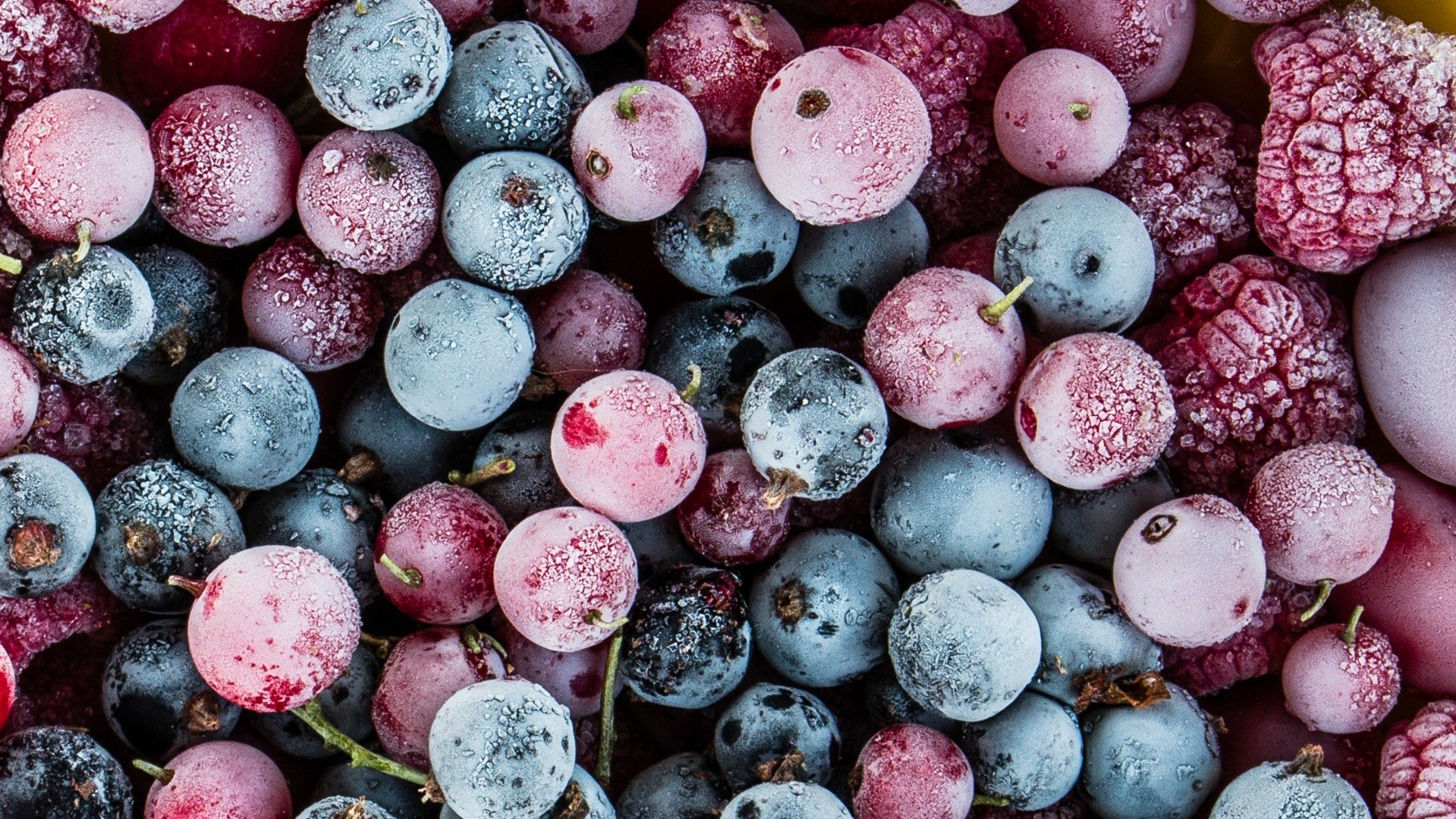
Frozen products mostly ripe during harvest and are processed to a minimum before freezing. Most vegetables and fruits are heated in warm water for a few minutes before freezing. This process deactivates enzymes that cause unwanted changes in colour, smell, taste, or nutritional values. However, if we compared the fruit and its nutrient content before and after freezing, we would find only small changes in composition. Overall, fruits and vegetables have very similar nutritional values in frozen and fresh state. [1]
To better compare the nutrient content between fresh and frozen, we’ve created a table for you [22] [23]:
| Calories (kcal) | 32 | 35 |
| Protein (g) | 0,7 | 0,4 |
| Fats (g) | 0,3 | 0,1 |
| Carbohydrates (g) | 7,7 | 9,1 |
| Dietary fibre (g) | 2,0 | 2,1 |
| Water (g) | 90,9 | 90,0 |
| Vitamin C (mg) | 58,8 | 16,5 |
| Vitamin E (mg) | 0,3 | 0,3 |
| Folic acid (mg) | 0,024 | 0,017 |
| Calcium (mg) | 16,0 | 16,0 |
| Magnesium (mg) | 13,0 | 11,0 |
| Sodium (mg) | 1,0 | 2,0 |
| Potassium (mg) | 153 | 148 |
9. You must receive the protein immediately after training
One of the controversial topics is the so-called “anabolic window”. This is a state of the body just after training, when protein intake can greatly improve muscle growth. This myth can be better called an exaggeration. After training, the body needs to replenish its proteins to prevent the body from getting to the catabolic stage. Taking 20-40 g of protein within 2 hours of training is ideal, but not necessary, as the anabolic window myth says. More important than protein uptake time is all day protein intake. If you are interested in learning more about protein dosing, read our article – When and how much of protein to take for maximum results? [1]

10. Egg yolks increase the risk of heart disease
The topic of eggs and cholesterol has been discussed for decades. Eggs were considered healthy for some time and later dangerous, and these claims were constantly alternated. The influence of cholesterol on heart disease is still under investigation.
The fear of eating eggs is based on the fear of egg yolks and their cholesterol content. However, research results show that egg consumption increases the level of “good” HDL cholesterol and does not increase the risk of heart disease. A review of 17 studies with a total of 263,938 participants did not show the effect of eggs on the risk of heart disease in healthy people. If you are not a diabetic, do not worry about eating eggs. Eggs are among the foods with the highest nutrient content and almost all are found in the yolk. Due to unnecessary cholesterol fears, you may be deprived of important nutrients by refusing eggs. [1] [2]

11. Your body needs regular detox
More and more people believe in the beneficial effects of detoxification. You may be surprised that this is a myth.
What is detox anyway? Toxins are substances of plant or animal origin which are toxic to humans. They may include drugs that are toxic in high amounts. Modern “detox gurus” include even heavy metals, preservatives and everything synthetic among them. In 2009, 10 companies were engaged in the sale of 15 detox products. But none of them could name a single toxin that their products could eliminate. [1] [7]
In our body, the liver, kidneys, lungs and other organs take care of pollutants. By reducing the nutrient intake required for these processes, you are slowing down the natural detoxification process. Diets that only drink smoothies or detoxifying teas are therefore not appropriate and may pose a potential risk to the liver and kidney. Would you like to learn more about detox and body cleansing? Read our article – Detoxification – how will your life change in 10 days? [1] [8] [9]
12. Bread is unhealthy
You gain weight from bread and gluten is harmful. These are the two most common arguments of pastry opponents. Bread can really be a source of excess calories, but it depends mainly on the ingredients you put on it. People tend to consume pastries along with calorie foods such as butter, jam or honey. However, nutritional ingredients containing vitamins and minerals such as vegetables and fruits are also suitable for bread. [1]
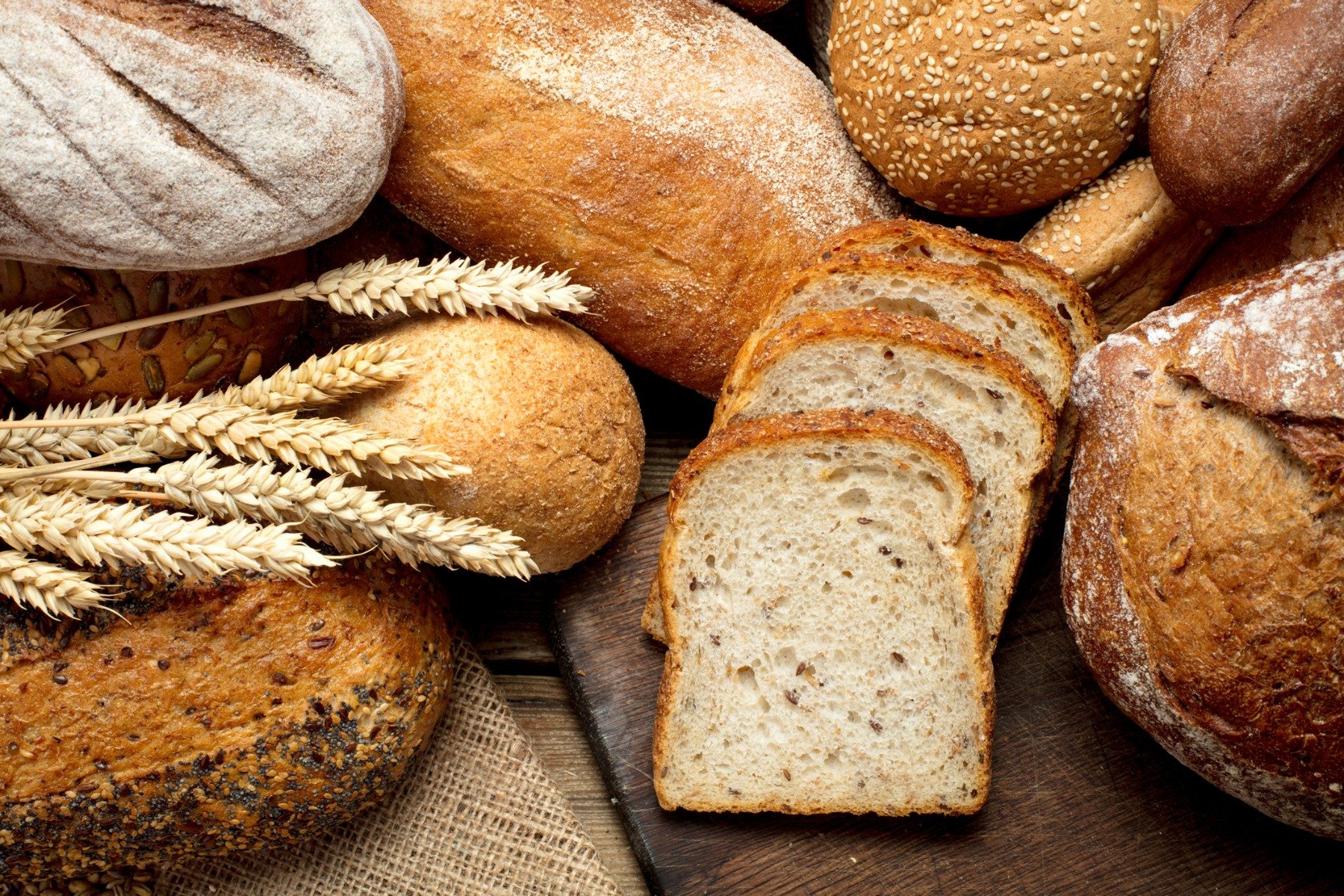
What bread to choose?
You will not be surprised that “white bread” is not the most suitable pastry. A significantly better choice is the whole grain bread, which has several advantages. What are they? [1] [16] [17]
- It has a low glycaemic index – a glycaemic index is a value that determines how quickly food is absorbed and digested in the body. Blood sugar levels rise based on the level of the glycaemic index.
- It has a low insulin index – an insulin index is a value that determines how much insulin is excreted during food processing. Foods with a low insulin index are less burdensome for the pancreas to produce insulin.
- It has higher fibre content – our body digests fibre slowly, which prolongs the feeling of satiety. In addition, fibre lowers “bad” LDL cholesterol, keeping healthy intestines and blood pressure normal.
13. Organic foods are better
Organic foods are not chemically treated with pesticides or herbicides. But do they have more nutrients than ordinary foods? The 2012 study looked at the difference between organic and classic diets. Organic foods have not shown more nutrients or less health risk. This means that there are no significant differences between them. Whether you buy ordinary or organic foods, the nutrient content is the same, only the price is different. [11]
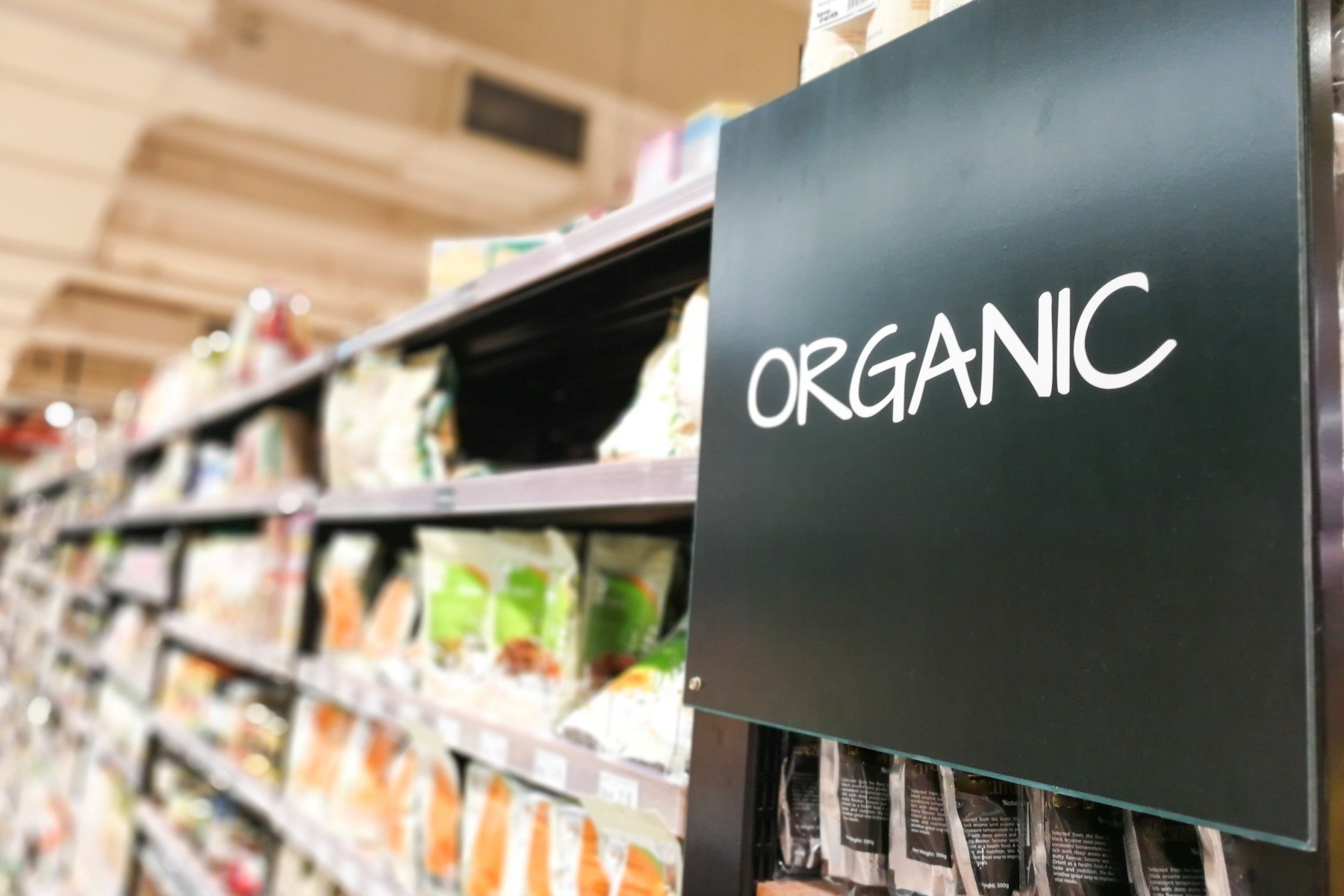
People also prefer organic foods for ecological reasons, because the idea is that organic foods are less burdensome for the planet. Scientists in the UK examined the environmental impact of organic food production. The results will surprise you [11]:
- organic milk and dairy products are the main source of greenhouse gas emissions
- the production of one litre of organic milk requires 80% more land than the production of ordinary milk
- organic milk causes a 20% higher global warming potential
- in the production of organic milk, 60% more animal waste is discharged into water resources
- organic food farms cause a 70% higher risk of acid rain
14. Vegetarian diet is healthier
There is a generally accepted notion among vegetarians that they are healthier because they do not take as much fat as meat consumers. Do you think this is true?
The vegetarian diet is full of vitamins, minerals, fibre and unsaturated fats. This type of diet is based on plant diet and animal products with the exception of meat. Vegetarianism protects against cardiovascular diseases, diabetes or high cholesterol. However, every meal needs to be checked for fat and carbohydrates, and this also applies to vegetarians. [12]
“Vegetarian” or “vegan” may not automatically mean a healthier choice. Vegetarian products may contain higher sugar or oil content, similar to meat variations. In the consumption of vegetarian products, the control of nutritional values is just as important as in conventional products. This means that being a vegetarian does not automatically mean being healthier. Reasonable composition of the diet and balanced nutrient intake are important. [13]
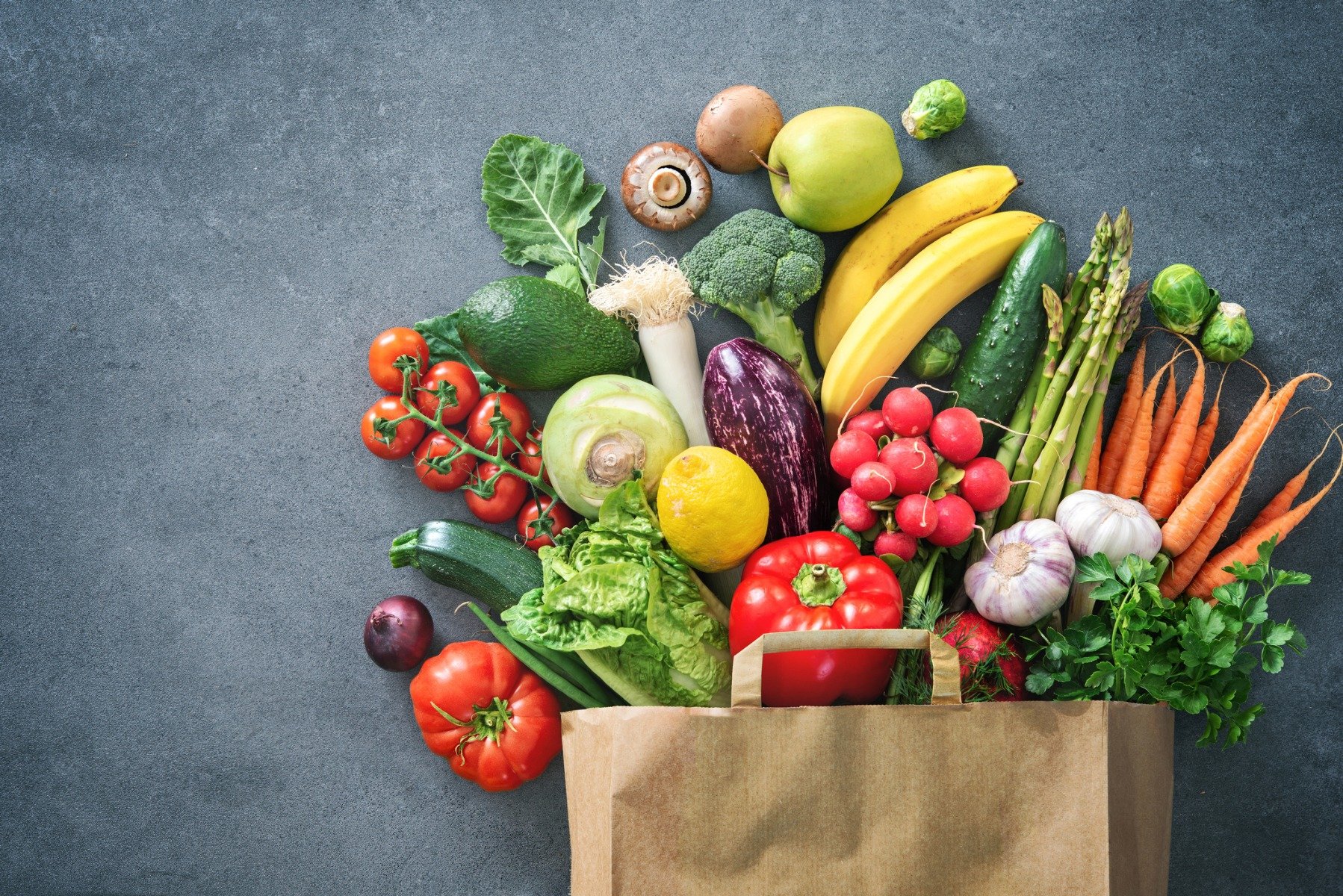
15. You should eat 5 small courses a day
Have you heard of a theory that recommends eating more smaller courses during the day? This model of eating is also a myth.
It is scientifically substantiated that the number of courses does not affect fat reduction. If you are a man and your daily calorie intake is 2500 kcal, it doesn’t matter if you spread the portions over 3 or 5 courses. According to some studies, more smaller portions of food can cause you to have less satiety and this can lead to increased food intake. Eating more often is unnecessary in this respect and can even be harmful. It is not natural for the human body to constantly feel satiety. Once upon a time it was common to be affected from time to time, and it was not usual to eat as often as it is nowadays. [1] [21]

When eating several smaller courses during the day, metabolism is accelerated only at a slight rate. Compared to the classic 3 courses, the difference in calories burned is minimal, or almost none. However, if you feel hungry during the day and need to eat too much in the evening, eating small portions may be ideal for you. [26]
We believe you have learned new information about diet, food and nutritional myths. Did you like this article? We will be happy if you support it by liking and sharing.
[1] Michael Hull - The top 19 nutrition myths of 2019 – https://examine.com/nutrition/awful-nutrition-myths/#summary6
[2] Kris Gunnars - 20 Mainstream Nutrition Myths (Debunked by Science) – https://www.healthline.com/nutrition/biggest-lies-of-nutrition
[3] Jeanie Lerche Davis - Salt: Don't Ban It Entirely – https://www.webmd.com/diet/features/salt-dont-ban-entirely#1
[4] Dietary Reference Intakes: Water, Potassium, Sodium, Chloride, and Sulfate – http://www.nationalacademies.org/hmd/Reports/2004/Dietary-Reference-Intakes-Water-Potassium-Sodium-Chloride-and-Sulfate.aspx
[5] Is coffee good or bad for me? – https://www.bbc.co.uk/programmes/articles/33ZMcgqDsFpvCBvPHlYDcNT/is-coffee-good-or-bad-for-me
[6] Kris Gunnars - 13 Health Benefits of Coffee, Based on Science – https://www.healthline.com/nutrition/top-13-evidence-based-health-benefits-of-coffee
[7] Toxins – https://medlineplus.gov/ency/article/002331.htm
[8] Makkapati S., D'Agati V.D., Balsam L. - "Green Smoothie Cleanse" Causing Acute Oxalate Nephropathy – https://www.ncbi.nlm.nih.gov/pubmed/29203127
[9] Kesavarapu K., Kang M., Shin J.J., Rothstein K., - Yogi Detox Tea: A Potential Cause of Acute Liver Failure – https://www.ncbi.nlm.nih.gov/pubmed/29204300
[10] Tehrene Firman - 20 Worst Food Myths That Still Persist – https://bestlifeonline.com/food-myths/
[11] Rob Johnston - The great organic myths: Why organic foods are an indulgence the world can't afford – https://www.independent.co.uk/environment/green-living/the-great-organic-myths-why-organic-foods-are-an-indulgence-the-world-cant-afford-818585.html
[12] Non-Vegetarian Vs A Vegetarian Diet: Which One Is Better And Why? – https://www.ndtv.com/health/non-veg-vs-veg-diet-which-one-is-better-and-why-1911835
[13] Alexandra Caspero - Building a Healthy Vegetarian Meal Myths and Facts – https://www.eatright.org/food/nutrition/vegetarian-and-special-diets/building-a-healthy-vegetarian-meal-myths-and-facts
[14] Krissy Kendall - 10 Nutrition Myths Debunked – https://www.bodybuilding.com/content/10-nutrition-myths-debunked.html
[15] Natalie Butler - Can fat be good for you? – https://www.medicalnewstoday.com/articles/141442.php
[16] What Is The Food Insulin Index? – https://www.gisymbol.com/what-is-the-food-insulin-index/
[17] Amanda Gardner - 18 Health Benefits Of Whole Grains – https://www.huffpost.com/entry/whole-grains-health-benefits_n_5655022
[18] Yvette Brazier - How much salt should a person eat? – https://www.medicalnewstoday.com/articles/146677.php
[19] Danilo Alfaro - What Is Iodized Salt? – https://www.thespruceeats.com/what-is-iodized-salt-995726
[20] Rachael Link - Should You Use Iodized Salt? – https://www.healthline.com/nutrition/iodized-salt
[21] Kris Gunnars - Top 11 Biggest Lies of Mainstream Nutrition – https://www.healthline.com/nutrition/11-biggest-lies-of-mainstream-nutrition
[22] Strawberries, raw – https://nutritiondata.self.com/facts/fruits-and-fruit-juices/2064/2
[23] Strawberries, frozen, unsweetened – https://nutritiondata.self.com/facts/fruits-and-fruit-juices/2066/2
[24] 11 Myths About Coffee You Need to Stop Believing Immediately – https://www.huffpost.com/entry/11-myths-about-coffee-you_b_7603758
[25] Christopher Labos - The Water Myth – https://www.mcgill.ca/oss/article/health-nutrition/water-myth
[26] Joyce Hendley - The 13 Biggest Nutrition and Food Myths Busted – http://www.eatingwell.com/article/16296/the-13-biggest-nutrition-and-food-myths-busted/


Add a comment